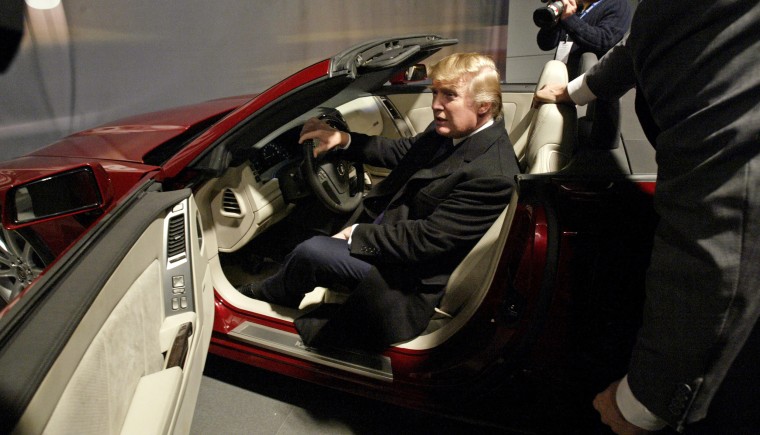President Donald Trump will meet with the CEOs of the Detroit Three automakers in the Oval Office Tuesday morning, and it’s expected there will be plenty on the agenda.
Trump has put a lot of emphasis on the auto industry since launching his campaign in 2015, notably taking shots at the largest of the two domestic makers for importing cars from Mexico. He has threatened to enact a “big border tax,” according to a tweet fired at General Motors earlier this month, scuttled the Trans-Pacific trade pact, and advised both Mexico and Canada of his plan to renegotiate the NAFTA deal.
While industry officials worry about the impact of new trade barriers, they’re also hoping to get a sympathetic ear from the new president on a variety of their own concerns, including corporate taxes and government regulations like the tough Corporate Average Fuel Economy, or CAFE, mandate the EPA reaffirmed in the final hours of the Obama administration.
How campaign rhetoric will translate into policy has been a simmering question within automotive circles.
In Search of Specifics
“I need clarity. I think we all need clarity,” Fiat Chrysler Automobiles CEO Sergio Marchionne said during a media roundtable at the North American International Auto Show in Detroit on January 9. "And we are not the only ones that need clarity."
Automakers are particularly concerned about Trump’s threat to crack down on cross-border trade, particularly with Mexico, which has become one of the five largest car-producing nations in the world in recent years. Almost all major automakers now operate assembly plants south of the border, and Ford took intense heat from candidate Trump when it announced, last April, plans to move all small car production to Mexico.
Related: Ford Cancels Mexico Plant But Is Still Moving All Small Car Production to Mexico
Earlier this month, Ford announced it was scrubbing plans to build a $1.6 billion plant in that country, but contrary to statements Trump quickly made, it will still go ahead with plans to move small car production to Mexico. General Motors and FCA have since announced new investments and jobs for the U.S., but those plans were already laid out well before the November 2016 election.
The new president could spell out for the Detroit CEOs just how tough he is going to be on trade, and whether he will follow up with the 35 percent tariff he has suggested he could put in place.
The automakers, on the other hand, are likely to stress the challenges they would face were they forced to produce all vehicles sold in the U.S. within American borders. They could point to a study released this month by the Michigan-based Center for Automotive Research that warned that eliminating NAFTA would actually cost 31,000 American jobs.
Other experts warn that vehicle prices would also surge while consumers would wind up with fewer vehicles to choose from.
Controversy Around Fuel Economy Regulation
The industry leaders are far more open to the idea of cutting corporate taxes, as well as Trump’s pledge to scale back government regulations. Nowhere would they like to see that more than when it comes to CAFE. The outgoing Obama administration just last week locked down the controversial 2025 target of 54.5 mpg.
Another study predicts that while the industry could reach that goal, it could add thousands of dollars to the average vehicle’s price tag, hammering demand.
While Gloria Borquist, the vice president of communications for the trade group Auto Alliance, called the EPA decision “disappointing,” CAFE proponents hope to convince the new president to leave the rule stand. Fuel economy standards “are spurring investment, creating and securing American jobs, cutting pollution, and building a better quality of life for families across the nation — it is common sense to continue this momentum,” argues Kim Glas, executive director of the BlueGreen Alliance.
Related: Takata Agrees to Pay $1B to Settle Airbag Deaths Probe
In recent years, the Obama White House wielded both carrot and stick in dealing with the auto industry. It cracked down hard on criminal and ethical abuses: fining GM nearly $1 billion for failing to catch a deadly ignition switch problem, and negotiating nearly $20 billion in settlements covering Volkswagen’s diesel emissions scandal. Six VW employees were also indicted, as were several executives at Takata, the Japanese supplier that covered up problems with fatally flawed airbags.
What the Industry Wants
But the Obama administration also set up the first-ever industry-government consortium aimed at bringing new safety technology to market faster than would be possible through the traditional rulemaking process.
Expect to see the Detroit CEOs — and their import colleagues — argue that this is the approach they’d like to see more of in the years ahead.
As a businessman, Trump liked to promote himself as a master of deal-making. It would surprise few if the Tuesday White House meeting would be the start of that process for the auto industry.
